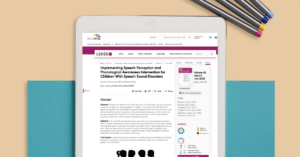Listen on Apple Podcasts Listen on Spotify
This Week’s Episode: Informal Assessments for Speech Sound Disorders (Part 1)
This month we have the pleasure of learning from Lindsey Hockel, the owner + creator behind Speechy Things.
She’s a specialist when it comes to learning the /r/ sound, and she currently runs a small private practice where she has a caseload full of R kids. We are in for a real treat this month! Lindsey brings a ton of clinical experience to the table and she is an avid research nerd like me. 🤓
Last week we talked through some of the considerations we should be thinking about when we’re navigating a speech sound disorders evaluation, and she delivered some incredible tips and strategies.
Today Lindsey shares even more tips! We discuss where to get started with informal assessments. She is an incredible resource when it comes to speech sound disorders and I hope you learn as much from this conversation as I did!
Let’s get to it, shall we?!
Topics Discussed
‣ Case history
✓ Open-ended questions (Dr. Megan Hamilton)
✓ Feelings towards their speech
✓ Medical History
✓ What the parent thinks I need to know about their child
‣ Quality language sample
✓ Make sure the student is comfortable
✓Build a rapport
✓ Chat with the kids about their favorite things, conversation cards, or draw pictures
‣ Structural-functional exam
✓ Structure: symmetry, dentition, tonsils, palate
✓ Function: dissociation, range of motion, proprioception, adequate control over their tongue
Amy Gram 17
…and so much more!
Want to learn more about Speech Sound Disorders?
🍎 Check out Lindsey’s website and blog: Speechythings
🍎 Lindsey Hockel is on insta! @speechlythings
🍎 Are you an SLP Now Member? Check out all of our materials on Speech Sound Disorders
🍎 For additional resources check out our blog post with Amy Graham: How to Tackle Oral-Facial Exams
🍎 Amy Graham on insta! @grahamspeechtherapy
✨ Not an SLP Now Member? Join our free 14-day trial! Your first 5 downloads are on us! ✨
Here’s what to expect this month:
November, 29: Assessing Speech Sound Disorders: Getting Started
December, 6: Assessing Speech Sound Disorders: (Part 1)
December, 13: Assessing Speech Sound Disorders: (Part 2)
December, 20: Assessing Speech Sound Disorders: Making Recommendations
Subscribe & Review on iTunes
Are you subscribed to the podcast? If you’re not, subscribe today to get the latest episodes sent directly to you! Click here to make your listening experience auto-magic and as easy as possible.
Bonus points if you leave us a review over on iTunes → Those reviews help other SLPs find the podcast, and I love reading your feedback! Just click here to review, select “Ratings and Reviews,” “Write a Review,” and let me know what your favorite part of the podcast is.
Thanks so much!
Transcript
Marisha: Hello there and welcome to the SLP Now podcast where we share practical therapy tips and ideas for busy speech language pathologists. Grab your favorite beverage and sit back as we dive into this week's episode.
Welcome back to the SLP Now Podcast. We are continuing our series with Lindsay from Speechy Things and she is an incredible resource when it comes to speech sound disorders, especially R therapy. So I'm really excited to continue the conversation about informal assessment with Lindsay today. Are you ready to dive in?
Lindsey: Ready.
Marisha: Let's do this. So the first informal assessment tool that you mentioned is the case history. You talked a little bit about the case history last time, how you would give the parents a form to use before your evaluation and then when they come in you review that with them. So can you tell us a little bit more about the types of questions you ask? You mentioned using open-ended questions. What could that conversation look like?
Lindsey: Really quick before I miss it. We've all heard about open-ended questions and it can just lead you down pathways that you didn't even know existed. Just asking so tell me how your child is at home. You never know what will come up with an open-ended question. That way you're not guiding the conversation based on your own biases or perceptions.
But I wanted to add, I watched a CEU from Dr. Megan-Brette Hamilton on culturally responsive assessment and she emphasized this as well. I just thought it was such a good point asking open ended neutral questions. So instead of saying, "So what's the problem with your child's speech?" Say, "Tell me about your child's speech." That's the only example I can think of off the top of my head. But the point being to just keep it very neutral I think is important. So I just wanted to throw that in there 'cause it was a really good session for her.
Anyway. So questions I might ask would be how is your child doing in school? Educational impact is important even in a clinical setting. But then I would also ask about how they communicate at home. You want to know intelligibility ratings across communication partners. So not just the parent, but distant relatives, close friends, teachers. Especially for the R sound, I usually ask the parent about how their child feels about their speech, if they're getting frustrated. I usually try to ask the student that as well separately.
For medical history, we're looking for red flags. I want to know about... Some questions you can ask that'll kind of lead you toward tongue tie or airway issues could be asking about did they have any trouble feeding as an infant? Whether breast or bottle. Do they snore? Do they have allergies? Asking about any previous surgeries. You want to know about history of ear infections and how many they've had, if they ever had tubes in their ears.
Marisha: Awesome. That's a great overview of what to include in the case history. So the takeaways here are to use open-ended questions and having neutral open-ended questions. Asking about how the child's doing in school, what they're noticing about the speech, medical history to help us figure out where we're going. You had something to add?
Lindsey: Yes. Something else I really like to ask is tell me what you think I need to know about your child. Usually in there you get some kind of insight into the personality. Whether they're really shy at first, but they warm up or asking about what their favorite things are. Because then you can use that whenever you're getting a conversational sample. Who doesn't love talking about whatever their favorite video game is or whatever it is.
But asking those questions ahead of time I find so helpful because then if I have a material that relates to their favorite, I can bring that. If I know that they are shy or if I know that they are... If something indicates they might need extra movement, then I can have that in mind going into the assessment.
Marisha: Yeah, that's perfect. 'Cause I feel like when an evaluation walks in... Or I'm seeing a student for the first time during an evaluation, you never know what to expect. If you have that on your case history form where it's what are their favorite things, you can be the coolest person right off the bat. You just can factor in one of their interests. It's perfect. So that's super helpful overview of what we can do with case history. Then what about a speech sample?
Lindsey: So for a speech sample, this is where I like to incorporate those favorites usually. I usually sort of use the speech sample also as a time to build rapport because so many kids, I feel like sometimes they're just a little embarrassed. Part of this I think is my slant working with kids with R because that's really all I do now. So a lot of them are maybe a little bit older, they're very aware of this error. Maybe they've been in speech for a long time, but I just try to be sensitive to how they're feeling and make them feel as comfortable as possible while also listening to as many contacts as I can.
So sometimes I'll bring in silly pictures. I'll ask them about what they did this weekend, ask them about their favorite vacation, ask them about their family, their friends. You could have them retell something about their favorite movie or their favorite book. Anything I can think of. For a younger kid, then I might bring out one of those staple toys that SLPs usually have in their closet, like the Critter Clinic or something to do with pretend play. Again, bringing out their favorites as much as I can, or having them tell me about their favorite sport. I feel like those are all good ways to get kids talking.
Marisha: Great tips. I love it. Thank you. Then what about the structural functional exam? What does that look like for you?
Lindsey: I do them. I would love for somebody to come up with a course where they do a structural functional exam and talk you through everything they're seeing and what it means. I want to see examples of kids' mouths, all kinds of kids' mouths. I just feel like I look at it, I'm looking for structure of course. So I'm looking for symmetry. I'm looking at their dentition. Are there any teeth missing? Are they a little bit out of place? I want information on their palette. Is it narrow? Is it looking typical? Is it a high arch in their palette? Definitely looking at tonsils.
Anything that might indicate structurally something could be going on, even though I don't necessarily think any one thing is a guaranteed issue for speech sound disorders, but it's good information to have. I also, again, I feel like this comes into place so much with the R sound, and by the way, I feel like all this information is very slanted so far towards articulation. So I just got to throw that out there. That so far I've not been touching on phenology as much, but we'll get there.
In terms of function, I pay attention a lot to whether I think they have good proprioception and tongue jaw dissociation. I want to know if they have adequate control over their tongue and whether they can move it in the ways that they will need to move it depending on what speech sounds I've already noticed they have an error.
Marisha: Perfect. I did a podcast episode with Amy Graham way back when, it's episode 17. So if you're in the same boat as Lindsay and I and you feel like you could use a little bit of extra information on the SFE checkout episode 17. You can just scroll back in whichever podcast app or go to SLPNow.com/17. She's created a really cool informal assessment that helps you walk through and know what to look for. So it definitely decreased my overwhelm and increased my level of confidence.
Lindsey: Oh, for sure and she has some on Instagram. I know she posted some videos of her doing a structural functional exam.
Marisha: She did.
Lindsey: But I want more from her. I'm like I want you to tell me exactly what you're seeing and what you're going to do about it.
Marisha: What referrals we need to make. Yeah, she's the one who should make that course.
Lindsey: I think so too. I think so too.
Marisha: I love it. Okay, so I think that's a really good overview of the case history, speech samples and the structural functional exam. So that'll be a wrap on our review of informal assessments for today. Then next week we'll talk about perception tasks and trial therapy.
Thanks for listening to the SLP Now Podcast. If you enjoyed this episode, please share with your SLP friends and don't forget to subscribe to the podcast to get the latest episode sent directly to you. See you next time.
Sign up to receive email updates
Enter your name and email address below and I'll send you periodic updates about the podcast.




Reader Interactions